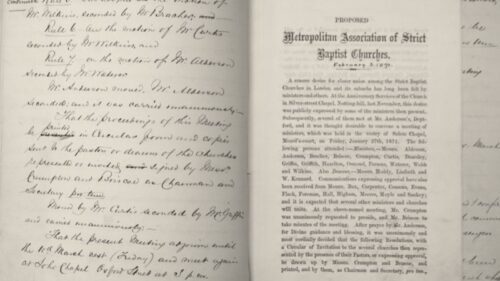
Rejoicing In Hope
[A Sermon Preached By The Late David Crumpton, At Grove Chapel, Camberwell, On The Lord’s-Day Morning, July 19, 1874]
“Rejoicing in hope.”—Romans 12:12
The Apostle in this chapter exhorts the believing Romans to the exercise of the grace of HOPE, engraven in their hearts by the Holy Ghost, who had called them “out of darkness into marvellous light.” Time will not allow me to enter on the other exhortations contained in this chapter, but only to call your attention to the one in the text.
Hope is one of the graces of the Spirit, and a very blessed grace it is. The Apostle pronounces it to be, “A good hope through grace,” and we are assured it is ”As an anchor of the soul, both sure and steadfast, and which entereth into that within the veil, whither the Forerunner is for us entered, even Jesus, made an High-Priest for ever after the order of Melchizedec.” It is a hope that arises from the regenerating grace of the Holy Ghost in the heart; it is not the delusive imaginations of human nature, but a work of grace in the heart, leading the soul to hope in God, in Christ Jesus the Lord, and in the blessings and bliss to come. Its influences are of a blessed character; it helps us in the dark and distressing hour, and points beyond the circumstances, sorrows, trials, and afflictions of this present life, to that world where nothing of an afflicting character can enter.
Through hope, which is wrought in the heart by the grace of the blessed Spirit, the Comforter, we look to the work, merits, and intercession of Jesus Christ. It does not build itself upon human sufficiency, whether of the law or the Gospel, and knows no foundation but the foundation which is laid in Zion, an immoveable foundation, against which the gates of hell shall never prevail. This hope is the result and is secured by the covenant of grace, that we might have a strong consolation, who have fled for refuge to lay hold upon the hope set before us. And it is to the exercise of this grace, and through the exercise of this grace, that the Apostle exhorts us in the word of truth, “Rejoicing in hope.” Who should rejoice if not the children of God? Why should the children be sad? The children of this world have reason to weep day and night for evils, if they think of “A certain fearful looking for of judgment and fiery indignation, which shall devour the adversaries.” But the believer has abundant reason to rejoice, not in present attainments, but in the glorious prospect of happiness and bliss beyond this vale of tears; and he is here exhorted to look upward, and believingly to expect that glorious result which divine love and power will accomplish, and to rejoice therein. “But hope that is seen is not hope; for what a man seeth, why doth he yet hope for? But if we hope for that we see not, then do we with patience wait for it.” We hope for something that is not yet possessed, that is not yet to be attained; but we sometimes seem to forget this, and because we have trials and troubles and difficulties, we hang our harps on the willows, and we forget what God has laid up in store for those that fear Him. We look to the roughness of the path and the difficulties in the way, and we rejoice not in hope. But God intended that His people should rejoice as they pass through this world. Hence, it is written, “Let the wilderness and the cities thereof lift up their voice, the villages that Kedar doth inhabit: let the inhabitants of the rock sing, let them shout from the tops of the mountains.”
Should not, therefore, you and I rejoice? Yes, indeed, we should. “Rejoice in the Lord alway, and again, I say, Rejoice.” O, ye mourners in Zion, have you thought of the eternal purposes of God’s love and mercy in Jesus Christ, who hath visited and redeemed His people and wrought out for them, and in them, an everlasting righteousness? Surely you must have forgotten or you would not bow down the head as a bulrush. “Rejoicing in hope” of deliverance, which should be the first object of our rejoicing. There are many things, various experiences, in our fallen state which cause a pressure on our mind and spirit, such as the Apostle Paul speaks of in the seventh chapter to the Romans—the conflict between the flesh and the spirit. He says, “I know that in me (that is, in my flesh) dwelleth no good thing, for to will is present with me, but how to perform that which is good I find not. For the good that I would I do not, but the evil which I would not that I do,” &c., &c. We feel almost impelled to do at times the evil we would not, the evil we hate. We feel we are encompassed with a nature sinful and corrupt, and through these manifold temptations we often wet our couch with tears. There are temptations suited to our nature which Satan well knows. He knows what that sin is which doth so easily beset us. And these temptations sorely pain and distress, besides the afflictions that betide us. “Man that is born of a woman is of few days and full of trouble. He cometh forth like a flower, and is cut down: he fleeth also as a shadow, and continueth not” (Job 14:1, 2). Religion does not exempt us from the ordinary afflictions of humanity. Religion is intended to sustain us under them.
“’Tis religion that can give
Sweetest pleasures while we live;
’Tis religion must supply
Solid comfort when we die.
After death its joys will be
Lasting as eternity;
Be the living God my friend,
Then my bliss will never end.”
Yes, the blessed influences of religion sustain the heart in trouble, but do not exempt the child of God from trouble. “Many are the afflictions of the righteous” (which some of us know by experience), but let us not forget what follows—“But the Lord delivereth him out of them all.” This is what we hope for. This is why we should be “Rejoicing in hope.” There will be a time when we shall put off this body of clay, when this body shall be laid in the earth, and when that which respects this body shall be effected; when this corruption shall have put on incorruption, and this vile body shall be changed, that it may be fashioned like unto the glorious body of the Lord Jesus Christ. The leprosy of sin is so deep in the walls of human nature, that the whole tabernacle must be taken down before it can be taken out. Yes, “We look for the Saviour, the Lord Jesus Christ, who shall change our vile body, that it may be fashioned like unto His glorious body, according to the working whereby He is able even to subdue all things unto Himself.” And it is in this hope of deliverance from sin, Satan, death, and the grave, that the believer has abundant reason to rejoice. If we are the children of God we may anticipate the time when—
“Our inward foes shall all be slain,
Nor Satan break our peace again.”
What a glorious deliverance there will be by-and-bye! but we must believe, hope, and expect, and rejoice in expectation of that glorious deliverance which shall be accomplished in our individual cases:—When He shall purge from Jacob, all iniquity, and present His blood-bought, ransomed Church to His Father, “Before the presence of His glory with exceeding joy, without spot or wrinkle, or any such thing.” Is not this something to rejoice in? When I think that a few more rolling years will bring me from all that is sinful and corrupt, I may well rejoice in hope.
Then the words of our text suggest the idea of enlargement. Paul considered he knew but little, for he says, “For we know in part and we prophesy in part,” &c. He knew but in part; but how he seems to long to know more. “This one thing I do, forgetting those things which are behind, and reaching forth unto those things which are before, I press toward the mark for the prize of the high calling of God in Christ Jesus.”
What enlargement shall be enjoyed by the saint of God after death! Who can tell with what heavenly honours he will be invested! We are lost when we contemplate the visions of that soul. We are lost in wonder; we are lost in amazement when we think of
“That sea of life and love unknown,
Without a bottom or a shore.”
“For now we see through a glass darkly; but then face to face. Now I know in part; but then shall I know even as also I am known.” How limited are our ideas! How dull our apprehensions! How unbelieving our hearts! There is a cloud between us and our Lord, but it is only a cloud, and will ere long be dispersed. We are like the disciples on the Mount of Transfiguration, we know not what to say. But in yonder brighter and better world how the mind and the powers of the soul will be enlarged! Then we shall understand mysteries that perplex and distress us in this vale of tears; then we shall comprehend more of God, more of Jesus, more of the Holy Spirit.
“Then we shall see, and hear, and know
All we desired or wished below;
And every power find sweet employ,
In that eternal world of joy.”
Enlargement, beloved! We are not allowed to remain infants in the family. I might enlarge here did time permit, for I want, as it were, to take you up to heaven. O what an enlargement will take place in our state and feelings at the hour of death! O what a change to see and feel the love of God, began in us through grace, consummated in glory!
Let us bless God if there be this dawn of heaven in our souls; and let us look forward with joy in contemplating the time when we shall be with Christ, and be like Him, and see Him as He is. Then with regard to enjoyment here, how vastly different are the ideas of the Christian and the worldling, the godly and the ungodly! The godly, it is true, have their trials, afflictions, sorrows, losses, and crosses, but what of that if they have within a principle of grace which can comfort their heart and keep them from sinking in the deep waters they may be called to pass through. Whereas the enjoyment of the ungodly and the so-called happiness of the worldling is a delusion, and as “the crackling of thorns under a pot.” And though at times you may be tempted to suppose the worldling is the happier of the two, on account, it may be, of his freedom from the pains and anxieties you experience, it is, I say, a delusion. There is no real enjoyment or happiness to be found out of Christ.
The joy of the saint is in Christ Jesus his Lord: it has a hidden spring from the living Rock; the source is Christ, and can never, never fail. But let me tell the worldling that the sanctified sorrow in a believer’s heart is worth ten thousand worldly joys. It is by trials that God calls us to seek heavenly, eternal joys; for He says, “Arise ye, and depart; for this is not your rest, because it is polluted,” &c. But, connected with that rest which remaineth for the people of God, He has a plentiful store of those things which are incorruptible, and undefiled, and fade not away. Rejoice, then, in hope of enjoying those things which “Eye hath not seen, nor ear heard, neither have entered into the heart of man the things which God hath prepared for them that love Him.” What a joy will be a glimpse of Jesus, to see Him face-to-face! What must it be! When He shall wipe away all tears from our eyes, and reveal to us His Word, Himself, His fulness, His glory, and make us to participate in all, as children and heirs of God and joint-heirs with Himself.
All the glory here, and the fulness of joy above, which belongs to Christ, belongs to them, and by-and-bye they shall enter into that blessedness where they shall hunger no more, neither thirst any more; neither shall the sun light on them, nor any heat: “For the Lamb which is in the midst of the throne shall feed them, and shall lead them unto living fountains of waters: and God shall wipe away all tears from their eyes.” Rejoice, then, in hope. A few more years at most—it may be a few more months, days, hours, moments—and we shall enter into the glories, into the rest of heaven, into the fulness of those joys and pleasures for evermore which are at God’s right hand. Oh, dear friends, shall we not rejoice?
I have had my times of weeping and sorrow, but, in calmer moments, could say, Why should I weep? Why should I be cast down? There may be moments of darkness and distress, but all things are working together for my good. “Why art thou cast down, O my soul? and why art thou disquieted within me? Hope thou in God; for I shall yet praise Hirn who is the health of my countenance and my God.” Does His faithfulness fail? Is the love of Christ exhausted? No; ten thousand Noes to these enquiries!
Lift up thy head, mourner in Zion, and take comfort, for you shall be “more than conqueror” over every foe, without and within, “through Him that loved you and gave Himself for you.” On earth a man may have fought many a battle and come off conqueror, but, through Christ, we shall be “more than conquerors.”
To Him be glory and majesty, dominion and power, for ever and ever. Amen and Amen.
[Taken down by William Arthur Adams.]



